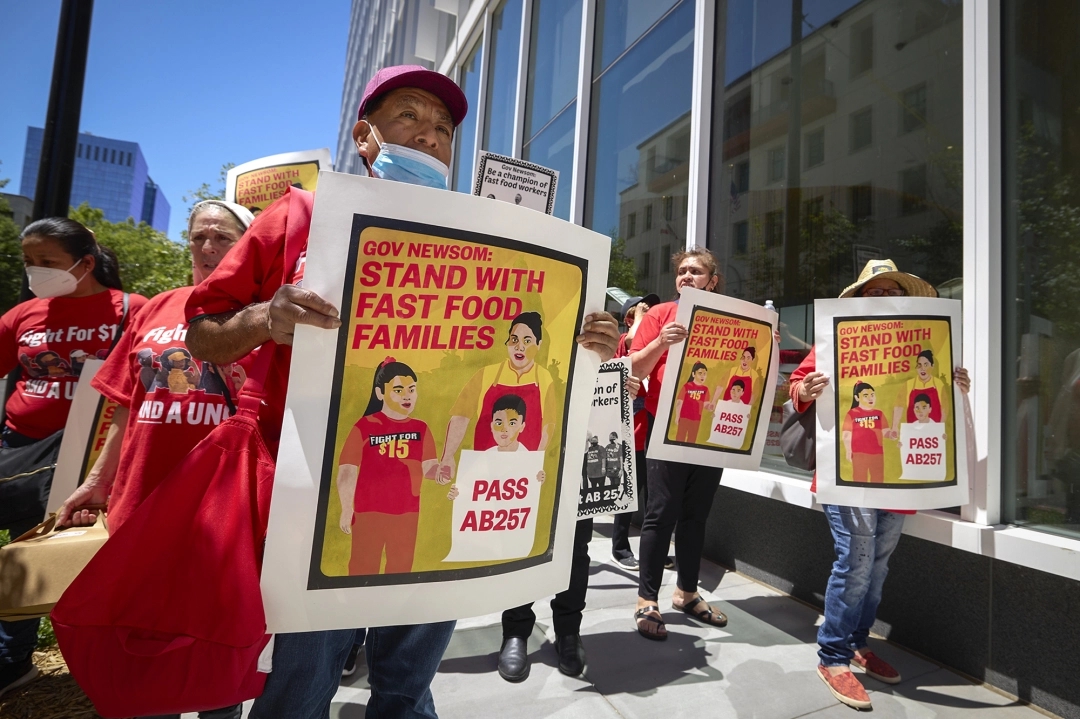Fast-food workers plan to caravan across Orange County on Wednesday, July 27, demanding passage of a bill aimed at protecting them from sexual harassment, wage theft, safety violations and violence in the workplace.
Assembly Bill 257, also known as the “FAST Food Recovery Act,” would create a state-run council to negotiate wages, hours and working conditions for the more than 700,000 fast-food employees in California.
The measure was passed in the Senate Labor, Public Employment and Retirement Committee last month and is set to be heard Aug. 11 in the Senate Appropriations Committee before heading to a full Senate vote later that month.
Not enough
Laura Pozos, who works at a McDonald’s in Los Angeles, said the $16 an hour she earns isn’t enough.
“They’ve cut our hours,” the 59-year-old East Los Angeles resident said recently. “I work 33 to 34 hours a week and it’s not enough to pay my bills. My light bill alone is $200 a month. These are miserable wages.”
The employees plan to take their demands directly to the district offices of Sen. Dave Min, D-Irvine, and Sen. Josh Newman, D-Fullerton, who have yet to take a position on the bill. They’re urging them to side with frontline workers, rather than cash-rich, fast food corporations.
They also plan to visit the corporate headquarters of Taco Bell, Chipotle and El Pollo Loco.
The Service Employees International Union is pushing for the passage of AB 257 as part of its “Fight for $15 and a Union” campaign. Los Angeles adopted a $15 minimum wage in 2015 and California followed suit in 2016, but unionization in the industry has been elusive.
Hundreds of fast-food workers held a similar gathering last month at Los Angeles City Hall as part of a statewide, one-day rally among fast-food employees.
Opposition to the bill
Some are not so quick to support AB 257.
The California Restaurant Association says the Golden State already has some of the nation’s strictest worker protection laws. The organization said California should instead fund its backlogged wage-theft and workplace-violation investigators.
“We believe the system is set up to be robust and protective,” association spokesman Matt Sutton said last month. “There’s a pathway for people, and they use it all the time.”
Franchisors and franchisees say AB 257 is unnecessary and burdensome and would raise prices for working-class customers.
“Inflation is top of mind for everybody,” said Jeff Hanscom, a spokesman for the International Franchise Association, which represents corporations and franchisees. “It just doesn’t make sense.”
AB 257 would give workers and franchisees a seat at the table to better negotiate for wage hikes, increased on-the-job protections and the resources needed for the restaurants to operate safely and in compliance with the law.
Pozos said she’s also experienced discrimination at her job.
“There is favoritism in our workplace,” she said. “Some workers are getting 40 hours a week, but others don’t.”
Mauricio Juarez, who works as an assistant cook at a Jack in the Box in San Diego, plans to participate in Wednesday’s rally. He says his work conditions are bad.
“We deal with issues of extreme heat,” the 62-year-old employee said. “Sometimes it gets over 100 degrees in the fryer area where I work … but we have to do it.”
Related Articles
Southern California cities get more time to rezone land for housing
Juarez currently earns $15 an hour but would like to see that boosted to $20.
Worker abuse
A January 2022 report from the UCLA Labor Center notes that even before COVID-19, fast food workers in Los Angeles County faced “disproportionately high rates of injury, workplace violence, harassment, retaliation and wage theft.”
Fifty-seven percent of workers surveyed said they were victims of multiple forms of wage theft, the report said, and a third of those surveyed said they suffered retaliation for asking to be paid properly, taking a sick day or asking to be paid for a sick day.





